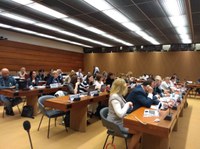
Joint UNECE-EEA workshop on open data for the environment
This workshop in Geneva took stock of the project outputs of the first meeting on open data and e-government for the environment (Kyiv, 5-6 March 2019) and national round tables in Armenia, Azerbaijan, Belarus, Georgia, Moldova and Ukraine. These national round tables focused on good practices for fostering environmental information sharing and dissemination, open data maturity reports, and roadmaps for these countries to improve their dissemination and sharing of environmental data through e-governance and open data initiatives.
The workshop achieved the following:
- Participants discussed the way forward for modernising environmental information systems and raising the profile of environmental information through its accessibility, sharing and wider dissemination, as well as by harnessing additional economic, social and environmental benefits.
- It promoted synergy by linking relevant initiatives of governments, partner organisations and other stakeholders to widen and improve the sharing and public accessibility of environmental information, including through electronic information tools and e-government, open government data, the SEIS in the pan-European region and other similar initiatives.
- It strengthened the capacity of authorities to implement the information pillar of the Aarhus Convention with a focus on effective provision of information by taking advantage of new and emerging digital technologies and on enabling the public to reuse information.
- It supported countries’ efforts to measure and monitor environment-related SDGs and targets, including target 16.10 on ensuring public access to information in accordance with national legislation and international agreements.
It is expected that the actions emerging from the national and regional events will continue at national level within the implementation of the Aarhus Convention, the Kyiv Protocol on Pollutant Release and Transfer Registers (as applicable), SEIS principles and other international commitments.
In terms of the impact of the project, there were a number of suggestions for the way forward:
- rethink how to report the state of the environment (using modern technology, providing time series, using the internet to transfer data, leverage on open data, providing real-time data and reporting, involving civil society, leveraging e-government, providing user-friendly reporting, providing a single access point for environmental information);
- discuss the roadmap further at national level, taking into consideration the national strategy and regional aspects;
- select a few measures from the roadmap and seek endorsement at national level;
- develop selected measures and detail potential projects;
- assess the financial and resource needs for moving forward;
- assess opportunities for funding potential actions;
- establish national thematic working groups/task forces to implement the projects;
- set up control and monitoring mechanisms;
- set priorities and delegate responsibilities for implementing the identified actions;
- leverage international experience and join forces in the region where applicable — for instance initiating similar/sub-regional initiatives;
- update the maturity reports in 1 or 2 years’ time and assess the results.
All the materials related to the event are available on the UNECE website.
Background
‘The EU needs to go further in developing a competitive, secure, inclusive and ethical digital economy… Special emphasis should be placed on access to, sharing of and use of data…’
European Council, 22 March 2019
The EU-funded project ‘Implementation of Shared Environmental Information System principles and practices in Eastern Partnership countries’ (ENI SEIS II East) is a 4-year project implemented by the EEA over the period 2016-2020. The series of regional and national round table discussions in Eastern Partnership countries are a dedicated component under the framework of the ENI SEIS II East project, implemented by the EEA in consultation with colleagues from the Aarhus Convention Secretariat and with the support of PricewaterhouseCoopers (PwC) Lithuania (and branches in ENI Eastern Partnership countries) as a contractor.
The main goal of the project is ‘to develop a roadmap and identify feasible and practical means for integrating environmental information in national e-governance/Open Data processes and platforms’ for the six EU Eastern Neighbourhood countries: Armenia, Azerbaijan, Belarus, Georgia, Moldova and Ukraine.
The open data component of the project aimed to connect the current work with other environmental information sharing and dissemination activities at both national and European levels. In particular, it covers the thematic work undertaken within the ENI SEIS II East project areas of work, activities overseen by the Aarhus Convention, as well as current initiatives taking place in the EU on open data (e.g. Open Data in Europe), streamlining environmental reporting and improving access to environmental information (e.g. action 5 in the action plan for improving environmental reporting: Promote best practices for European and national Environmental Information Systems).


